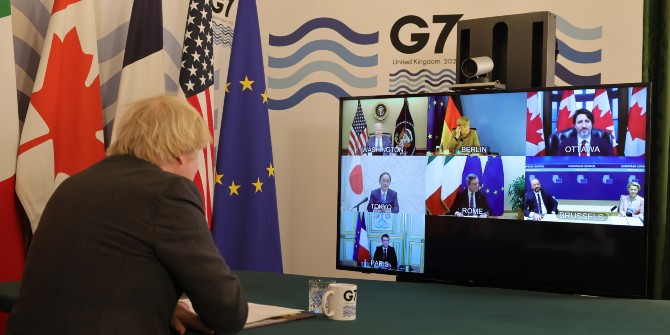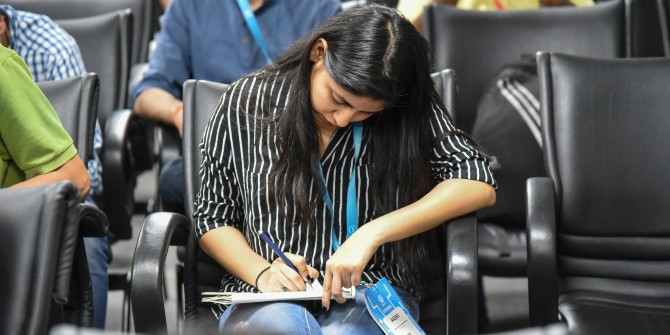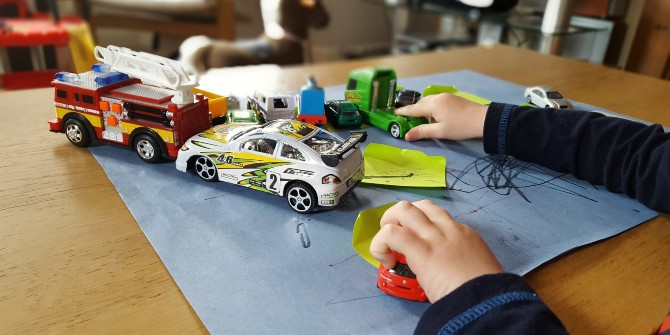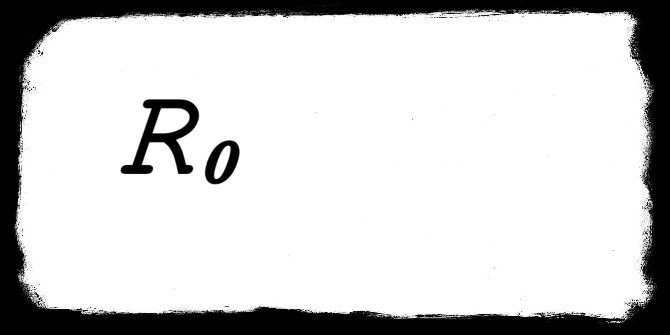With real-world summits all but impossible during the pandemic, diplomacy has been on hold. The days of shuttling people around the world for short, exhausting conferences may be over, says former diplomat Tom Fletcher (Oxford University), but the task of overcoming newly-erected national barriers is more urgent than ever.
Tom Fletcher is responding to Tristen Naylor’s LSE Festival Short, What is the Future of Diplomacy? Join in the discussion by posting a comment below.
As we begin to contemplate life after lockdowns, what have we learnt about diplomacy?
Firstly, the structures may change but the substance won’t. I agree with Tristen that there is no substitute for what Edward Murrow called ‘the last three feet’, the human contact that generates the trust for negotiations, the pressure for concessions and – increasingly – the visuals that can often say more than any communique. Not the staged grip and grins, but the impromptu theatre that can give us a sense of the real dynamic between leaders. Imagine the photo, for example, if Joe Biden had been able to meet leaders in person in Munich last week. The optics, as we used to call them in No 10, would have been a key part of the message: America has once again filled the vacancy Trump left as leader of the free world.
Yet I disagree with Tristen in one area – I hope that one legacy of the pandemic is that leaders and diplomats stop believing that the answer to every 21st century challenge is an international conference. Flying people from around the world to sit in close proximity for gruelling periods in airless rooms no longer feels quite right. Even without the virus, the climate crisis should have taken some of the shuttle out of shuttle diplomacy.

Secondly, that experts and expertise are back, after a period of retreat. In the end it was not social media influencers or reality TV politicians who got us out of this crisis, but scientists, doctors, nurses, teachers and care workers. If diplomacy did not exist, the task of rebuilding international cooperation would demand that we invent it. At times of global crisis, we need diplomacy more than ever. Diplomats are the lubricant in the system that ensures that ingenuity, co-operation and collaboration between countries can take place. So this should be an extraordinary decade of diplomacy. I try to encourage senior and aspiring diplomats to imagine what Nobel Peace Prizes we need in the coming years, and then get out there and earn them.
Thirdly, that the context for that diplomacy just got a lot harder. The virus will remain another weapon in the armoury of those who believe that the answer to the 21st century is to build a bigger wall. Ironically, a pandemic that exposed the weakness of systems for international cooperation led some politicians to campaign on more nationalist platforms. Meanwhile, resources have moved to other priorities, with some serious bills still in the post. So COP26 is vital – not just as what John Kerry calls the last chance to reverse climate crisis, but as a reassertion of the 20th century’s great idea: that we can work together across national boundaries to defend the best of humanity and confront the worst. Let’s not forget that while diplomacy has been stuck at home, crucial peacemaking efforts – Syria, Libya, Israel/Palestine – have been set back. There has been less energy to contain viruses such as extremism, radicalisation and injustice, or to protect refugees and civilians under attack. Former US President Dwight Eisenhower warned, long before social media and Oval Office tweeting proved him right, that “what is important is seldom urgent and what is urgent is seldom important.”
Finally, this virus has shifted geopolitics in ways we are only beginning to see. It is too soon to say whether more authoritarian or democratic governments proved better at responding. The economic and reputational hit will be greater in some countries than others, moving them up or down the hard and soft power league tables. Beyond the lockdowns, there will be real setbacks to cross-border efforts to tackle crime, narcotics and terrorism: plenty of people will not let a good crisis go to waste. Future pandemics may also create a new form of migration – away from areas perceived to be at higher risk. Alongside climate-driven migration, this could be a huge driver of geopolitical change. The sad reality is that the longer term impact of the pandemic will hit the more vulnerable hardest, increasing perceptions of inequality and fuelling distrust of governments and elites.
We need to stockpile compassion for those individuals, communities and nations that the virus will hit hardest. We can sanitise our political debate of the xenophobia and selfishness that the crisis will encourage in some quarters. We can keep calm and carry on with the quiet, patient work of educating the next generation, including the Alexander Flemings who will discover the vaccines of the future. We can choose not to wash our hands of the long list of other challenges we need to confront.
And, as Tristen urges us, maybe we can come to observe that all of those challenges – from climate to conflict to automation to pandemics to genuine equality of opportunity – require us to work more closely together as human beings. Even if there are times when we need to distance ourselves from one another.
Statecraft is the only business that elevates the handshake to the evidence of success, and not just the start of a process. When it comes to the global challenges ahead, we are all still in the most vulnerable demographic. Tristen is right to remind us: handshaking is coming back, and not a moment too soon.
This post represents the views of the author and not those of the COVID-19 blog, nor LSE.





2 Comments